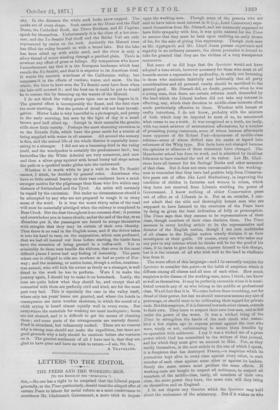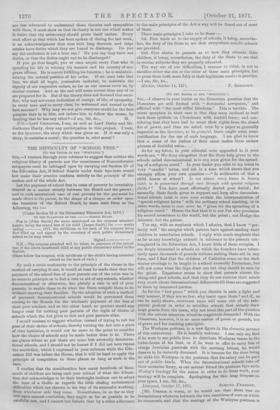LETTERS TO THE EDITOR.
THE PEERS AND THE WORKING-MEN.
[To THE EDITOR OF THE "SPEOT4T011.1
Sin,—No one has a right to be surprised that the Liberal papers generally, or the Times particularly, should treat the alleged offer of certain Peers to labour for social reform as a mere contrivance to overthrow Mr. Gladstone's Government, a mere trick to impose
upon the working-men. Though some of the persons who are said to have taken most interest in it (e.g., Lord Carnarvon) sepa- rated themselves from Mr. Disraeli, and are commonly supposed to have little sympathy with him, it was quite natural for the Times to assume that they must be bent upon realizing an early dream of his, for the sake of giving him supremacy. Though such men as Mr. Applegarth and Mr. Lloyd Jones possess experience and sagacity in no ordinary measure, the clever journalist is bound to take for granted that they are the victims of a very transparent manceuvre.
But some of us did hope that the Spectator. would not have adopted a tone which, however necessary for those who must at all hazards secure a reputation for profundity, is surely not becoming in those who maintain faithfully and habitually that all party considerations and all personal vanity should be sacrificed to the general good. Mr. Disraeli did, no doubt, perceive, when he was a young man, that there are certain reforms much demanded by the land which the Liberal leaders did not take any interest in effecting, nay, which their devotion to middle-class interests often made particularly offensive to them. Whether with honest or crafty intentions, I do not know, probably with the mixture of both which may be imputed to most of us, he announced what seems to me a truth. It was recognized as a truth, too lazily, with too much mixture of aristocratical affectations, by a number of promising young statesmen, some of whom became afterwards mere opposers of Sir Robert Peel—denouncers of middle-class reforms—some of whom drifted into his ranks or lapsed into reformers of the Whig type. But facts have not changed because the opinions or alliances of these statesmen have changed. The Manchester school has done its work, and is admitted by its ablest followers to have reached the end of its tether. Let Mr. Glad- stone have all honour for his Savings' Banks and other measures of that class. But it does not seem unreasonable in the working- men to remember that they have had positive help from Conserva- tive peers out of office like Lord Shaftesbury, in improving the condition of °linden in factories and women in mines, which they have not received from Liberals wielding the power of Government. I know nothing of either Conservative peers out of office or of Liberals in it. But as an outsider, I can- not admit that the able and thoroughly honest men who are supposed to have listened to the overtures of the Peers have by doing so given the least indication of folly or presumption. The Times says that they assume to be representatives of their class, though numbers of their class disclaim them. The Times assumes in every leading article to be the representative and dictator of the English nation, though I am sure multitudes of all classes in the English nation utterly disclaim it as their mouthpiece or their guide. Of course, every one who takes any any part in any scheme which he thinks will be for the good of his class, if be dares to give his name, exposes himself to this charge, but it is the interest of all who wish well to the land to vindicate him from it.
The worst effect of this language—and I do earnestly conjure the Spectator to consider this point—is the habit of suspicion which it diffuses among all classes and all men of each other. How much suspicion is the disease of the working-men, none, I think, can know so well as themselves. It may be perfectly excusable when it is mani- fested towards any of us who belong to the middle or professional class. We all feel that it is. We come before them trembling, not for dread of their power, but lest we should unawares assume any airs of patronage, or should seem to be cultivating their regard for private ends. But this suspicion, if it is fostered to wards other classes, extends to their own. They learn to suspect their own beat men, and so fall under the power of the worst. It was a wicked thing of the Times to strengthen the hands of the mob chiefs who assem- bled a few nights ago to express protest against the men who were, wisely or not, endeavouring to secure them benefits by co-operation with noblemen. I say it was a wicked use of a great
power which God has committed to the writers of that journal, and for which they must give an account to Him. For, as they testify themselves, in the next article to the one of which I speak, it is Suspicion that has destroyed France,—a suspicion which its journalists kept alive in every class against every other, in each member of each class against some other or against its leaders.
Surely the same causes must produce the same effects. If working-men are taught to suspect all noblemen, to suspect all members of the middle-class, lastly, all members of their own class, the more power they have, the more ruin will they bring on themselves and on England.
I do not dispute any theories which the Spectator may hold about the uselessness of the aristocracy. But if it wishes us who are less advanced to understand those theories and sympathize with them, it must show us that its theory is not one which makes it desire that the aristocracy should prove itself useless. Every such effort as that which has been spoken of during the last week, is an acknowledgment that men with long descents and large estates have duties which they are bound to discharge. Do you say the confession is not a true one ? Do you say they have not duties, or that the duties ought not to be discharged ?
If you go that length, you at once acquit every Peer who is spending his life in ruining his tenants and his country of any grave offence. He is merely fulfilling his function ; he is maintain- taining the natural position of his order. If we once take that line, we shall all begin, journalists included, to maintain the dignity of our respective orders, so far as our means serve us, by similar courses. And so the end will come sooner than any of us are prepared for it. But if the theory does not demand that sacri- fice, why may not every indication of energy, of life, of sympathy, in every man and in every class, be welcomed and turned to the best account? Why may we not give everyone credit for the best purpose that is in him, not induce him to follow the worse, by denying that he has any other 7-1 am, Sir, &c., M.
P.S.—Lord Carnarvon, I see, as well as Lord Derby and Mr. Gathorne Hardy, deny any participation in this project. I took, as the Spectator, the story which was given us. If it was only a story, it contains a moral ; the question is, what moral ?



































 Previous page
Previous page